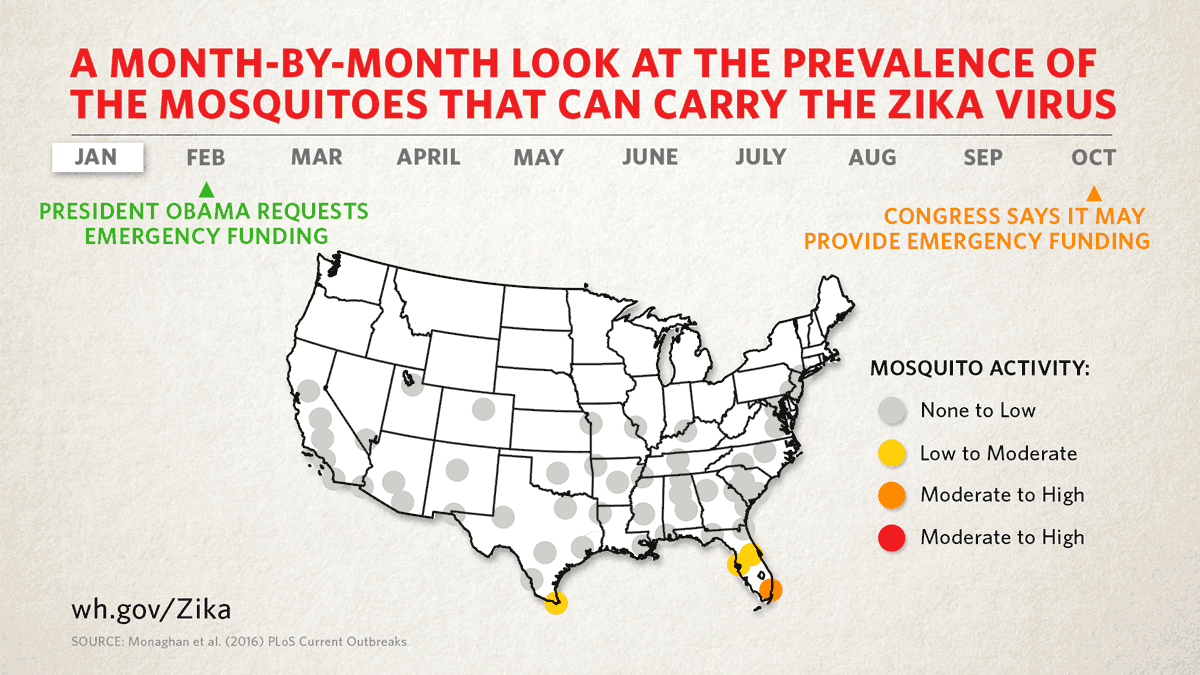
The weather is getting warmer, and summer is here! While we are all thinking about cook-outs and swimming pools, the Administration remains hard at work in our efforts to keep the American people safe from Zika virus. Over the summer, we will be highlighting the steps that public health officials are taking across the country and steps that you can take at home to protect yourself. We know that it’s going to take all of us in communities across the country, and we won’t take our eye off the ball until we effectively stop the spread of Zika virus.
The President was briefed by his public health team – including Secretary of Health and Human Services Burwell, Centers for Disease Control and Prevention (CDC) Director Frieden, and National Institutes of Health (NIH) Director Fauci – on how we expect the disease could spread in the coming months. In preparation, we reprogrammed nearly $600 million to help support our national Zika response by conducting mosquito control, expanding lab capacity, developing faster diagnostics and vaccines, mapping the spread and effects of Zika infections in humans, and mounting other prevention and response efforts.
State and local officials are going to be the front line defense against this virus, and the U.S. Department of Health and Human Services (HHS), has been working in close coordination with local public health officials for months to help them prepare for the potential transmission of Zika via mosquito in the continental U.S.

On Wednesday of this week, HHS also issued guidance about how Medicaid can help states and territories prevent, detect, and respond to the Zika virus. The guidance highlights that state Medicaid programs can cover mosquito repellents when prescribed by authorized health professionals and reviews the wide array of services that states can cover to assist with diagnosing, treating and supporting Medicaid recipients with Zika virus.
While the Administration will remain hard at work, you can also take steps right now to protect yourself from Zika virus. The Centers for Disease Control and Prevention provides guidance that they continually update as we learn more about Zika:
Zika virus disease is a disease caused by the Zika virus, which is spread to people primarily through the bite of an infected Aedes species mosquito. The most common symptoms of Zika are fever, rash, joint pain, and conjunctivitis (red eyes). The illness is usually mild with symptoms lasting for several days to a week after being bitten by an infected mosquito. People usually don’t get sick enough to go to the hospital, and they very rarely die of Zika. For this reason, many people might not realize they have been infected. However, Zika virus infection during pregnancy can cause a serious birth defect called microcephaly, as well as other severe fetal brain defects. Once a person has been infected, he or she is likely to be protected from future infections.
Our public health experts have provided extensive information on how to avoid getting Zika virus in the first place by taking typical steps to avoid mosquito bites this summer. These include wearing long shirts and pants, using registered insect repellents, and taking steps to control mosquitos inside and outside of your home – like making sure there is no standing water where mosquitos can breed.
Even with everything we’re doing to respond to and prepare for Zika, we still need Congress to act. Public health experts agree we need the full $1.9 billion in emergency funding the President requested to effectively respond to the spread of Zika Virus. Here’s how emergency funds will help us combat the spread of the disease at home and abroad in the coming months:
- accelerate vaccine research and diagnostic development;
- conduct mosquito surveillance and mosquito control;
- educate health providers, women, and partners about the disease;
- improve health services and support for low-income pregnant women;
- help Zika-affected countries better control transmission.
Just last week, Secretary Burwell sent a letter to Congressional leadership urging them to help raise public awareness about steps individuals can take to help protect themselves. HHS also reached out to members of Congress in areas where we believe there is a higher risk of Zika transmission, to share important information about Zika, the risks posed to certain populations and information about steps individuals can take to limit their risk of infection.
We will continue to take every step that we can to limit the spread of Zika, but we need Congress’ help. I am encouraged by the growing support for this legislation and remain hopeful that Congress will do the right thing and support emergency funding.
In the meantime, our public health officials are working around the clock to protect the health and safety of the American public with the resources we have.
Amy Pope is Deputy Homeland Security Advisor and Deputy Assistant to the President at the National Security Council

